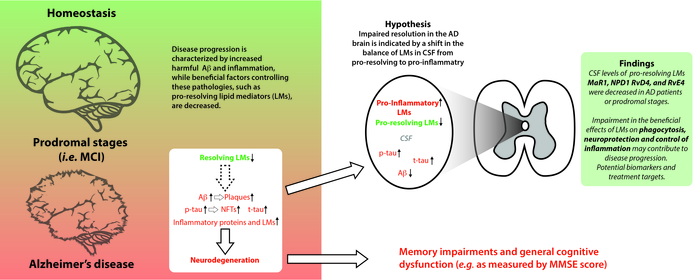New Orleans, LA – Researchers at LSU Health New Orleans Neuroscience Center of Excellence and Karolinska Institutet have discovered a potential biomarker for Alzheimer’s disease diagnosis that may also serve as a therapeutic target. Examining cerebrospinal fluid samples from patients with cognitive impairment ranging from subjective impairment to a diagnosis of Alzheimer’s disease, they found a shift in the profile of specialized lipid mediators from pro-resolving to pro-inflammatory. The results of the exploratory study are published in the Springer journal, Cellular and Molecular Neurobiology, available here.

Credit: Nicolas Bazan, MD, PhD
New Orleans, LA – Researchers at LSU Health New Orleans Neuroscience Center of Excellence and Karolinska Institutet have discovered a potential biomarker for Alzheimer’s disease diagnosis that may also serve as a therapeutic target. Examining cerebrospinal fluid samples from patients with cognitive impairment ranging from subjective impairment to a diagnosis of Alzheimer’s disease, they found a shift in the profile of specialized lipid mediators from pro-resolving to pro-inflammatory. The results of the exploratory study are published in the Springer journal, Cellular and Molecular Neurobiology, available here.
Specialized lipid mediators are bioactive compounds composed of polyunsaturated fatty acids like DHA and EPA. They are signaling molecules that regulate a wide range of cellular responses including cell growth and death, as well as infection and inflammation. Specialized lipid mediators have unique properties and roles in inflammation. Pro-inflammatory lipid mediators promote inflammation, and pro-resolving lipid mediators resolve inflammation.
It takes several years or more for Alzheimer’s disease (AD) to develop into dementia, and neuroinflammation is a key early contributor. During that time, subjective cognitive impairment (SCI) and mild cognitive impairment (MCI) can be used as intermediary diagnoses of increasing severity. The population of this study consisted of 136 participants – 53 with SCI, 43 with MCI and 40 with an Alzheimer’s disease diagnosis. The researchers assessed 22 lipids in samples of the participants’ cerebrospinal fluid (CSF), including pro-resolving lipid mediators, pro-inflammatory lipid mediators, prostaglandins, their fatty acid precursors and intermediate derivatives. Neuroprotection D1 (NPD1), discovered by the Bazan lab, is one the pro-resolving lipid mediators studied.
The research team found that levels of pro-resolving lipid mediators were correlated with severity of cognition impairment –the greater the severity, the lower the levels of the lipid mediators that resolve inflammation. They also found a relationship between cognition impairment severity and pro-inflammatory lipid mediators – the greater the degree of cognition impairment, the higher the levels of the lipid mediators that promote inflammation.
“Based on these findings, we are expanding our work to brain cell-specific targets, besides neurons, astrocytes and microglia, as well as additional novel protective signals, which would allow us to explore slowing down AD onset,” says Nicolas Bazan, MD, PhD, Boyd Professor and Director of LSU Health New Orleans Neuroscience Center of Excellence. “For this purpose, we have set up 10-x genomics to decipher not only the genes but also epigenomics engaged in early disease states. Since the CSF lipidome changes were closely correlated with detailed clinical and radiological AD patient status, we believe that the studied events are revealing novel essential mechanisms of brain health. A uniqueness of our approach is that we have discovered mechanisms and, more importantly, molecules that target those mechanisms and could became therapeutics.”
Other members of the LSU Health New Orleans research team include Drs. Khanh V. Do, Bokkyoo Jun, and Marie-Audrey I. Kautzmann. Ceren Emre, who recently completed her PhD at the Karolinska Institutet, worked at LSU Health New Orleans Neuroscience Center of Excellence for eight months before the pandemic. Other researchers from the Karolinska Institutet include Drs. Erik Hjorth, Ying Wang, Makiko Ohshima, Maria Eriksdotter, and Senior Professor Marianne Schultzberg, Bazan’s key collaborator.
Funding from the EENT Foundation of New Orleans, the Swedish Research Council, the Swedish Alzheimer’s Foundation, Stockholm County Council and the China Scholarship Council supported the research.
________________________________________________________________________
LSU Health Sciences Center New Orleans educates Louisiana’s health care professionals. The state’s flagship health sciences university, LSU Health New Orleans includes a School of Medicine with branch campuses in Baton Rouge and Lafayette, the state’s only School of Dentistry, Louisiana’s only public School of Public Health, and Schools of Allied Health Professions, Nursing, and Graduate Studies. LSU Health New Orleans faculty take care of patients in public and private hospitals and clinics throughout the region. In the vanguard of biosciences research in a number of areas in a worldwide arena, the LSU Health New Orleans research enterprise generates jobs and enormous economic impact. LSU Health New Orleans faculty have made lifesaving discoveries and continue to work to prevent, advance treatment, or cure disease. To learn more, visit http://www.lsuhsc.edu, http://www.twitter.com/LSUHealthNO, or http://www.facebook.com/LSUHSC.
# # #
Journal
Cellular and Molecular Neurobiology
DOI
10.1007/s10571-022-01216-5
Method of Research
Observational study
Subject of Research
Human tissue samples
Article Title
Cerebrospinal Fluid Profile of Lipid Mediators in Alzheimer’s Disease
Article Publication Date
1-Apr-2022
COI Statement
The authors declare that they have no competing interests.




